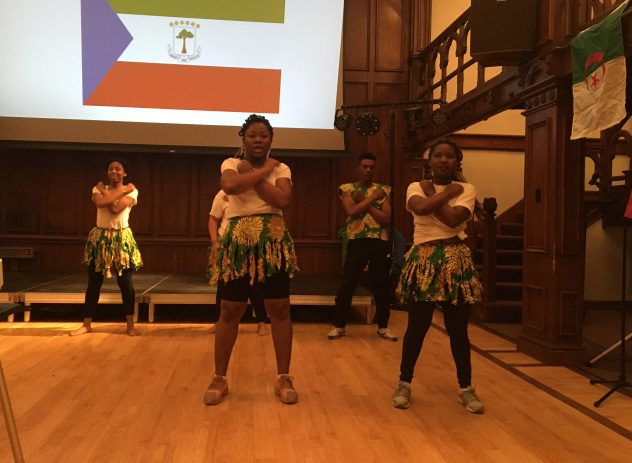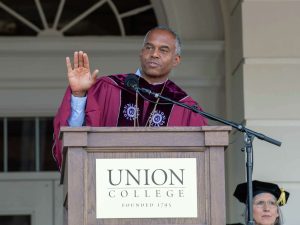African Dance Club presents second annual African Cultural Night
February 11, 2019
The second annual African Cultural Night highlighted the African experiece and how it is experienced by students, both during their childhoods and in the United States. The event took place on February 2 in Old Chapel and included performances and presentations by the African Dance Club (ADC), the organization which hosted the event. Additionally, there was a talk given by the Faculty Advisor of the ADC and Associate Professor of French and Francophone Studies Cheikh Ndaiye, games and skits meant to educate the audience about the culture and history of Africa.
After opening with a dance number, the host, Catherine Nakata ’19 invited Ndaiye up to speak. He played a song called, “Breaths” by Sweet Honey in the Rock, a musical groups made up of six African American women. The lyrics of this song were based on the poem, “Breaths” by Senegalese poet Birago Diop, which was translated into English by Langston Hughes. Ndaiye used the poem as a tool to explain the importance of nature, community and oral history in African tradition and how those things are relevant today.
“Going back to the theme of tonight, when you say ancestors in a very traditional context in Africa, you really are talking about the past and you’re talking about history, you’re talking about memory, all of that belongs to the past, that of course doesn’t stay in the past,” Ndaiye said.
He said that this is not unique to just people born in Africa. African Americans, other descendents of the African Diaspora and emigrants from Africa carry their ancestral history with them and it impacts their lives and culture in the present.
However, influence from the outside world is very present and it is something that poses an existential question for people who left Africa, Ndaiye included, who grew up in a village in Senegal that he described as “very, very small.”
“Whenever I go to the village, of course me being here for a while now going back, now I’m not the Cheikh that used to be there because, a long time before I left.
So I’m kind of struggling when it comes to time and space whenever I want to stay more than a week in the village. My pace is really is no longer the same as it used to be and yet I want to hide that because I don’t want to give them the impression that I have changed,” Ndaiye said.
He went on to say, “I’m struggling within space, time to be, to cherish what I have learned outside my village, but also to respect who I used to be and say, ‘Hey, I have been away for a long time but I can still be you…’ That’s one of the challenges we all face for those who grew up in that kind of environment and this is not unique to Africa, it can be applied to different parts of the world as well and different cultures… How do you bring together as your own home of you?”
This dilemma was also expressed by Jocelyne Akamaliza ’19 in a poem she wrote called, “Because of You, Motherland.”
In her poem, she voiced questions she had about leaving her home for increasing lengths of time and the potential consequences that may come with it, such as forgetting the beauty and comfort of her home.
“In the end, I will say that I found my happiness in your name, Motherland. I will say that I left you to gain more knowledge, that it was a responsibility bestowed on my shoulder to make you shine and proud. I will say that you accorded me freedom to do what I wanted, that you let me leave, that I learned, that I fell in love, and part of me wants to stay for more,” Akamaliza read in her poem.
Her resolution was that no matter what, her Motherland would never leave her.
She read this while presenting on her country of origin, Rwanda. All of the members of ADC presented on their home nations by sharing fun facts about the nation, dances, songs and recitations. In addition to Rwanda, ADC members presented on Nigeria, Togo, Cape Verde and Ghana.
As a group the members of ADC acted out a skit about what they learned in school in Africa and how their classrooms were run. They also ran a fashion show featuring trendy clothing in African nations and several games that were targeted at sharing and getting audience members to participate in African culture.
One of these games was an African children’s game and another was a trivia of African flags and capitals that the audience volunteers to compete for prizes in.
“I think that what the African Club is doing is wondering because they are reminding us again that, ‘Hey, we may be global and all that, but there is also something unique and special about us, that we want to share.’ And the idea of the notion of sharing is quite African, too,” said Ndaiye







